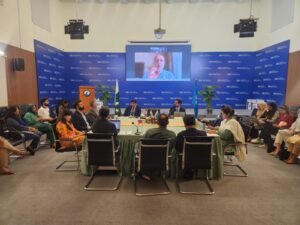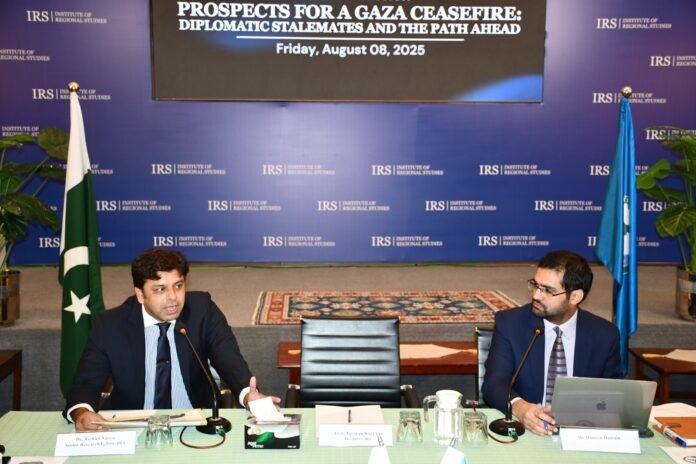Prospects for a Gaza Ceasefire: Diplomatic Stalemates and the Path Ahead
Islamabad – 8 August 2025 (Adnan Hameed) :

The Institute of Regional Studies (IRS) successfully hosted a high-level webinar on “Prospects for a Gaza Ceasefire: Diplomatic Stalemates and the Path Ahead,” bringing together prominent scholars to examine the ongoing conflict in Gaza, the political deadlock and the prospects for a sustainable ceasefire.
Dr. Rizwan Naseer, Senior Research Fellow at the Institute of Regional Studies, opened the session by highlighting the worsening humanitarian crisis in Gaza due to Israel’s ongoing military campaign and alleged use of starvation as a weapon of war. Dr. Naseer criticized the failure of international institutions and media to uphold human rights standards, pointing to UN warnings, ICC allegations, and repeated U.S. vetoes at the Security Council. He highlighted the need for urgent and coordinated global efforts to support the Palestinian cause.
Delivering one of the principal talks, Dr. Yezid Sayigh, Author and Senior Fellow at the Malcolm H. Kerr Carnegie Middle East Center, identified the political calculations and interests of Benjamin Netanyahu as the primary obstacle to a Gaza ceasefire, says press note. “What Netanyahu has been doing from the very first day of the war has been to escape a political predicament. Almost everything has been about buying time and time is bought with Palestinian lives”, he stated. Dr. Sayigh stressed that Israel’s military actions lack a clear strategic end goal.
Turning to regional dynamics, Dr. Sayigh stated that Israel’s policies are creating an intensely destabilizing impact on Egypt and Jordan, both fearful of mass Palestinian displacement. Looking ahead, he argued that “there is no amount of polite international pressure sufficient to shift an Israel that has moved so far to the right,” concluding that only sustained global mobilization, solidarity and coalition-building can pave the way for meaningful change.
The second talk was delivered by Dr. Abdaljawad Omar, Writer and Lecturer in the Philosophy and Cultural Studies Department, Birzeit University. He situated the Gaza War within historical continuum of Zionist settler-colonialism, arguing that Israel’s aim is not only military victory but the fragmentation and political incapacitation of the Palestinian people. Dr. Omar remarked that the ceasefire negotiations resemble the interrogation that Palestinian prisoners face in Israeli prisons. “From a Palestinian perspective, all dealing here is bad dealing. The problem is that the whole architecture of negotiation is placed on using leverage against Palestinians, to enable an Israeli victory”, he stated. He also addressed the disarmament of Palestinian resistance movements, noting that such measures, often framed as prerequisites for peace, would in fact neutralize the only deterrent forces capable of imposing costs on Israeli expansionism.
The event concluded with a dynamic Q&A session. Speakers stressed that symbolic recognition of Palestine must be matched by UN membership and genuine economic sovereignty. They also criticized the inaction of Arab governments and called for a reinvigorated Palestinian liberation movement supported by stronger global solidarity.






